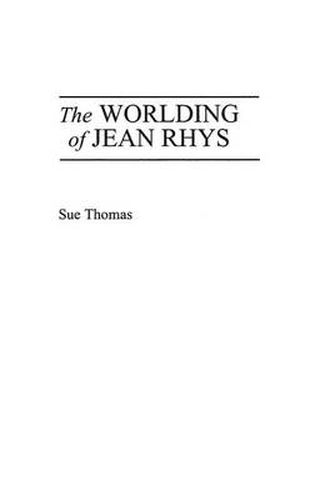Readings Newsletter
Become a Readings Member to make your shopping experience even easier.
Sign in or sign up for free!
You’re not far away from qualifying for FREE standard shipping within Australia
You’ve qualified for FREE standard shipping within Australia
The cart is loading…






Best known as the author of Wide Sargasso Sea, Jean Rhys continues to draw growing amounts of popular and scholarly attention. This book explores Rhys’s sense of world, the cross-cultural and the international in her novels, stories, and autobiographical writing. The volume situates Rhys’s writing in relation to the Dominican cultural production with which she was familiar, to Rhys’s family’s history on the island, and to European ethnographic discourses about white creole people. Special attention is given to the political and ethical locations of Rhys’s authorial and narrative voices with respect to discourses of empire, gender, sex, race, class, ethnicity, and desire. The book demonstrates that an historical reading of Rhys’s work poses questions for a number of current theoretical approaches.
Where and how does Jean Rhys write herself, her fiction, and her characters into history? To address this question, Sue Thomas has conducted wide-ranging primary and original research to elucidate Rhys’s sense of world, the cross-cultural and the international in her novels, stories, and autobiographical writing. She situates Rhys’s writing in relation to the Dominican cultural production and traffic with which she was familiar, to Rhys’s family’s history on the island, and to European ethnographic discourses about white creole people.
In her reading of Rhys’s fiction and autobiographical texts she analyzes the political and ethical locations of Rhys’s authorial and narrative voices with respect to discourses of empire, gender, sex, race, class, ethnicity, and desire that shaped Rhys’s sense of the materiality of the world. In doing so, Thomas draws out new dimensions of the racial, ethnic, and sexual formation of Rhys’s modernism. As a result, she demonstrates that an historical reading of Rhys’s work poses questions for a number of current theoretical approaches.
$9.00 standard shipping within Australia
FREE standard shipping within Australia for orders over $100.00
Express & International shipping calculated at checkout
Best known as the author of Wide Sargasso Sea, Jean Rhys continues to draw growing amounts of popular and scholarly attention. This book explores Rhys’s sense of world, the cross-cultural and the international in her novels, stories, and autobiographical writing. The volume situates Rhys’s writing in relation to the Dominican cultural production with which she was familiar, to Rhys’s family’s history on the island, and to European ethnographic discourses about white creole people. Special attention is given to the political and ethical locations of Rhys’s authorial and narrative voices with respect to discourses of empire, gender, sex, race, class, ethnicity, and desire. The book demonstrates that an historical reading of Rhys’s work poses questions for a number of current theoretical approaches.
Where and how does Jean Rhys write herself, her fiction, and her characters into history? To address this question, Sue Thomas has conducted wide-ranging primary and original research to elucidate Rhys’s sense of world, the cross-cultural and the international in her novels, stories, and autobiographical writing. She situates Rhys’s writing in relation to the Dominican cultural production and traffic with which she was familiar, to Rhys’s family’s history on the island, and to European ethnographic discourses about white creole people.
In her reading of Rhys’s fiction and autobiographical texts she analyzes the political and ethical locations of Rhys’s authorial and narrative voices with respect to discourses of empire, gender, sex, race, class, ethnicity, and desire that shaped Rhys’s sense of the materiality of the world. In doing so, Thomas draws out new dimensions of the racial, ethnic, and sexual formation of Rhys’s modernism. As a result, she demonstrates that an historical reading of Rhys’s work poses questions for a number of current theoretical approaches.